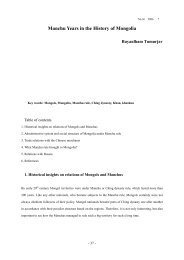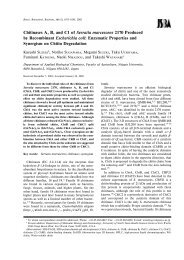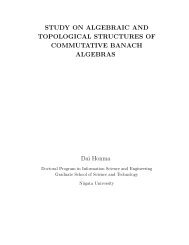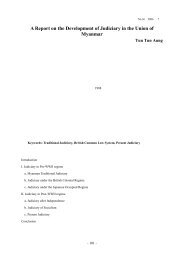An Overview of the Albanian History:
An Overview of the Albanian History:
An Overview of the Albanian History:
You also want an ePaper? Increase the reach of your titles
YUMPU automatically turns print PDFs into web optimized ePapers that Google loves.
No.34 2005 12 <br />
regard <strong>the</strong>mselves, and with pride as <strong>the</strong> descendants <strong>of</strong> <strong>the</strong> aboriginal settlers <strong>of</strong> <strong>the</strong> Balkan Peninsula.<br />
Therefore, <strong>the</strong>y think have <strong>the</strong> best claims on it. It is also on <strong>the</strong> strength <strong>of</strong> <strong>the</strong>se traditions that <strong>the</strong> <strong>Albanian</strong><br />
looks upon <strong>the</strong> o<strong>the</strong>r Balkan nationalities as mere intruders who have expropriated him <strong>of</strong> much that was<br />
properly his own. Hence <strong>the</strong> constant border warfare, which has gone on for centuries between <strong>the</strong> <strong>Albanian</strong><br />
and his neighbors. The origins <strong>of</strong> <strong>the</strong> <strong>Albanian</strong> people, as was mentioned before, are not definitely known, but<br />
data drawn from history and from linguistic, archaeological, and anthropological studies have led to <strong>the</strong><br />
conclusion that <strong>Albanian</strong>s are <strong>the</strong> direct descendants <strong>of</strong> <strong>the</strong> ancient Illyrians and that <strong>the</strong> latter were natives <strong>of</strong><br />
<strong>the</strong> lands <strong>the</strong>y inhabited. Similarly, <strong>the</strong> <strong>Albanian</strong> language derives from <strong>the</strong> language <strong>of</strong> <strong>the</strong> Illyrians, <strong>the</strong><br />
transition from Illyrian to <strong>Albanian</strong> apparently occurring between <strong>the</strong> 4th and 6th centuries AD. Illyrian<br />
culture is believed to have evolved from <strong>the</strong> Stone Age and to have manifested itself in <strong>the</strong> territory <strong>of</strong><br />
Albania toward <strong>the</strong> beginning <strong>of</strong> <strong>the</strong> Bronze Age, about 2000 BC. The Illyrians were not a uniform body <strong>of</strong><br />
people but a conglomeration <strong>of</strong> many tribes that inhabited <strong>the</strong> western part <strong>of</strong> <strong>the</strong> Balkans, from what is now<br />
Slovenia in <strong>the</strong> northwest to and including <strong>the</strong> region <strong>of</strong> Epirus, which extends about halfway down <strong>the</strong><br />
mainland <strong>of</strong> modern Greece. In general, Illyrians in <strong>the</strong> highlands <strong>of</strong> Albania were more isolated than those in<br />
<strong>the</strong> lowlands, and <strong>the</strong>ir culture evolved more slowly a distinction that persisted throughout Albania's history.<br />
Authors <strong>of</strong> antiquity relate that <strong>the</strong> Illyrians were a sociable and hospitable people, renowned for <strong>the</strong>ir<br />
daring and bravery at war. Illyrian women were fairly equal in status to <strong>the</strong> men, even to <strong>the</strong> point <strong>of</strong><br />
becoming heads <strong>of</strong> tribal federations. In matters <strong>of</strong> religion, Illyrians were pagans who believed in an afterlife<br />
and buried <strong>the</strong>ir dead along with arms and various articles intended for personal use. The land <strong>of</strong> Illyrians was<br />
rich in minerals; iron, copper, gold, silver and Illyrians became skillful in <strong>the</strong> mining and processing <strong>of</strong> metals.<br />
They were highly skilled boat builders and sailors as well 10 .<br />
II. Albania under <strong>the</strong> Ottoman rule<br />
Owing partly to <strong>the</strong> weakness <strong>of</strong> <strong>the</strong> Byzantine Empire, Albania, beginning in <strong>the</strong> 9th century, came under<br />
<strong>the</strong> domination, in whole or in part, <strong>of</strong> a succession <strong>of</strong> foreign powers: Bulgarians, Norman crusaders, <strong>the</strong><br />
<strong>An</strong>gevins <strong>of</strong> sou<strong>the</strong>rn Italy, Serbs, and Venetians. The final occupation <strong>of</strong> <strong>the</strong> country in 1347 by <strong>the</strong> Serbs<br />
caused massive migrations <strong>of</strong> <strong>Albanian</strong>s abroad, especially to Greece and <strong>the</strong> Aegean islands. By <strong>the</strong><br />
mid-14th century, Byzantine rule had come to an end in Albania, after nearly 1,000 years. A few decades later<br />
<strong>the</strong> country was confronted with a new threat, that <strong>of</strong> <strong>the</strong> Turks, who at this juncture were expanding <strong>the</strong>ir<br />
- 243 -







